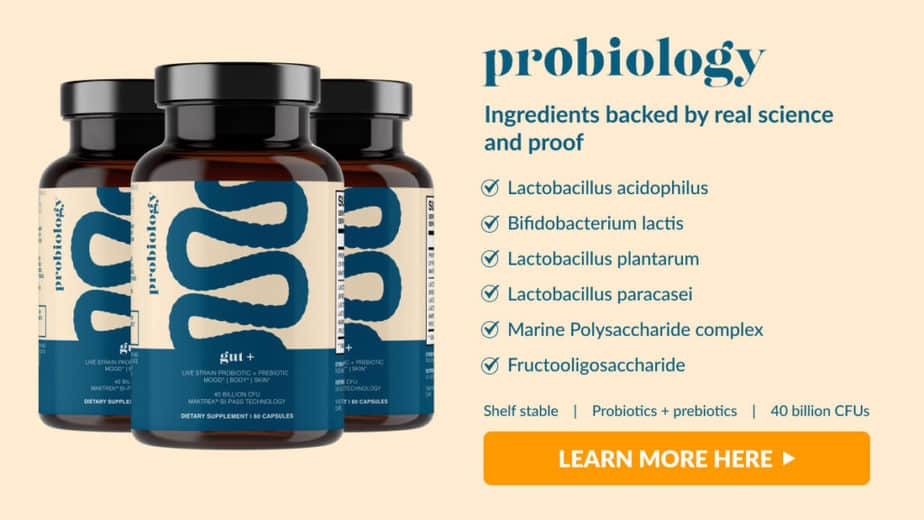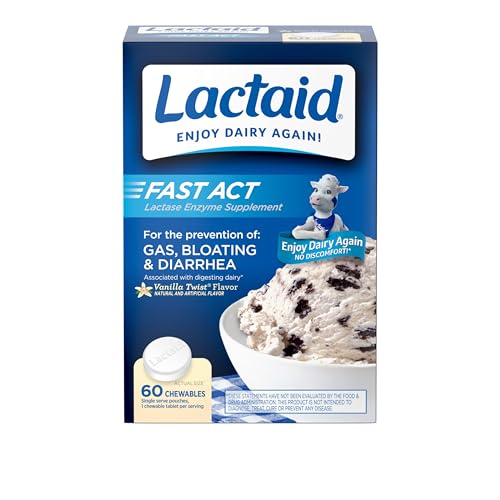The ability to digest lactose is considered a biological abnormality as most mammals can’t digest it after weaning in infancy. The inability to sufficiently break down lactose is commonly known as lactose intolerance.
For many, this inability to digest lactose begins at an early age. Commonly, after the age of two, many lose the ability to digest lactose. Yet, some may lose their ability to digest lactose later in life.
Other than not being able to enjoy dairy products, many suffer severe symptoms of lactose intolerance. Symptoms of lactose intolerance include gastrointestinal pain and discomfort, vomiting, diarrhea, cramping, and bloating.
These symptoms are not only experienced by those who are lactose intolerant, but can occur with several other GI conditions like inflammatory bowel disease (Crohn’s or ulcerative colitis), irritable bowel syndrome, and SIBO – small intestinal bacterial overgrowth.
For many who suffer from illnesses such as these, the introduction of probiotics is a growing solution to reduce and prevent symptoms.
However, probiotics are commonly found in dairy products leading us to question whether such bacteria will help or worsen lactose intolerance?
This post will answer whether probiotics can help with lactose intolerance and if so, how.
What Are Probiotics?
Probiotics are living organisms that exist as part of our gut’s microbiome (the ecosystem inside our intestines). They are considered helpful bacteria as they serve to maintain the health of your gut and your immune system.
A large amount of research has been done into how probiotics offer health benefits and reduce the number of harmful bacteria in your gut.
Probiotics can either be added naturally by eating specific foods or by taking probiotic supplements.
- Related Article: Guide to Probiotics and Prebiotics
What is Lactose Intolerance?
Lactose intolerance is the intolerance of dairy products. Those with lactose intolerance will know the uncomfortable effects that come from eating lactose such as diarrhea, excess gas, bloating, discomfort, nausea, and cramping.
Lactose intolerance occurs when lactose does not get broken down like it normally would in the small intestine, and it reaches the colon where bacteria breaks it down into fatty acids and gas, which leads to the gastrointestinal symptoms.
Learn more about how do you suddenly become lactose intolerant.
How Does Lactose Intolerance Work?
Understanding lactose intolerance is relatively simple. Lactose intolerance occurs when your small intestine is not producing enough lactase. This digestive enzyme is what’s used to break down the lactose in your food, so that it can be absorbed into the bloodstream.
Those who are lactose intolerant are unable to sufficiently break down lactose, as a result, lactose passes through the colon intact causing pain and discomfort.
As undigested lactose moves through to the colon, it is eaten by microorganisms that release a byproduct that causes flatulence, cramping, bloating, and pain.
Lactose intolerance shouldn’t be ignored, because it could be signs of a health condition that’s more serious.
Lactose Intolerance and Probiotics
There are many illnesses and diseases such as inflammatory bowel disease, IBS, and SIBO, that create similar side effects to those facing lactose intolerance. However, with an increase in research, there is a new solution to combating and preventing such side effects.
Probiotics have become the go-to for many who struggle with these symptoms, as they are known for improving and preventing gastrointestinal discomfort. Probiotics offer healing benefits that not only soothe your gut but improve your overall immune system.
However, probiotics are live microorganisms that are more commonly found in dairy products such as milk and yogurt, etc. So where does that leave those who are lactose intolerant?
Can Probiotics Help with Lactose Intolerance?
Yes! Probiotics can help with lactose intolerance. At face value, it can easily be assumed that probiotics would ultimately flare up lactose intolerance, but research has shown that probiotics have the added benefit of assisting in breaking down lactose.
These living microorganisms or ‘gut soldiers’ aid our gut in digesting lactose resulting in a reduced concentration of lactose in dairy products. They do this by working to increase the activity of enzymes which serve to break down the lactose.
Studies have shown that probiotics in dairy products and non-dairy supplements can help improve the digestion of lactose.
Fermented dairy products are more easily accepted by those with lactose intolerance as fermented foods enable lactose to sit longer in the small intestine allowing for more time for it to be broken down before moving the colon.
The probiotics in fermented dairy products also produce an enzyme that acts like lactase. This enzyme can effectively help break down the lactose in your body allowing increased absorption.
It is possible to combat the symptoms of lactose intolerance by altering the guts microbiome. We can alter our guts microbiome to introduce lactose-digesting bacteria. Once this bacteria is introduced it will act as lactase and consume the lactose, rather than a byproduct of gas, lactic acid will be produced.
This will effectively result in fewer gastrointestinal symptoms than would usually be created by excess gas. Altering your microbiome in this way can be done by ingesting lactic acid producing bacteria as a probiotic.
Lactobacillus: What is it?
Lactobacillus is a type of bacteria that produces lactic acid rather than gas. Lactic acid is created from the fermentation of carbohydrates. When added to dairy such as yogurt and fermented foods, this probiotic strain works to nourish the gut.
Lactobacillus helps to balance the gut microbiome and relieve symptoms of lactose intolerance by increasing metabolic activity in the colon and sufficiently breaking down lactose.
Lactobacillus can be added to your diet easily as it can be found in most dairy products and fermented foods such as kefir.
Ironically, dairy products and fermented foods such as milk and kefir are the ideal vessels for probiotics as the composition of carbohydrates, protein, and fat that can commonly be found in dairy products protects the probiotic all the way through to the gut. Doing so allows the probiotic to stay alive and safe against altering conditions in the stomach.
Probiotics for Lactose Intolerance
Bifidobacterium animalis is a prominent probiotic strain as it is known for treating symptoms of lactose intolerance. Two significant microbes work to metabolize lactose for you. They act as lactase and help to reduce gastrointestinal symptoms.
These two probiotic strains are Lactobacillus bulgaricus and Streptococcus thermophilus. Both of which have been known to not only reduce symptoms, but also improve tolerance.
While you can find these probiotics in dairy products such as yogurt, these probiotics can also be found in the form of pill supplements.
- Related Article: Is Activia Yogurt Good for IBS
Other probiotic strains such as Bifidobacterium animalis and Bifidobacterium longum are known for improving metabolic activity within the colon. The result is improved lactose tolerance and the digestion of lactose.

Takeaway
Despite misconceptions of whether probiotics can help lactose intolerance, this post has shown how probiotics work and how they work concerning those who suffer from lactose intolerance.
If you suffer from lactose intolerance, we hope that this post has given you all the information you need to take the next step to prevent symptoms of lactose intolerance and allow you to no longer be restricted in your dietary choices.
If you have a more severe case of lactose intolerance, the probiotics may not be enough to help reduce symptoms. Lactase enzyme supplements (like Lactaid) also exist to help break down the lactose in your dairy products.
For other related articles, check these out:


